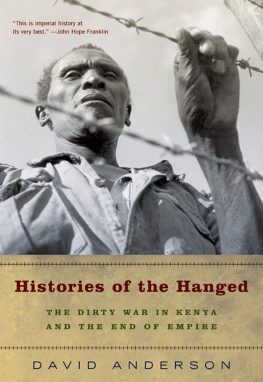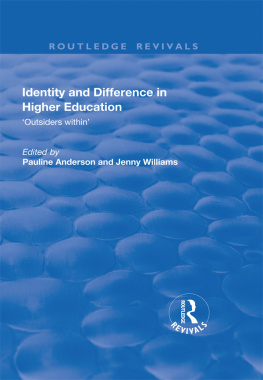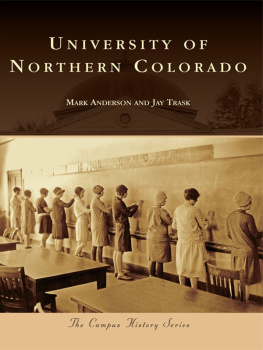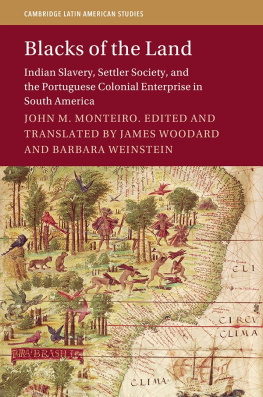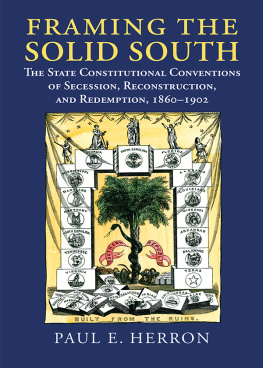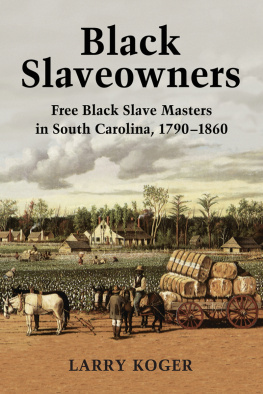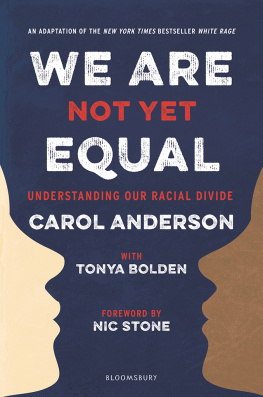Anderson - The education of Blacks in the South, 1860-1935
Here you can read online Anderson - The education of Blacks in the South, 1860-1935 full text of the book (entire story) in english for free. Download pdf and epub, get meaning, cover and reviews about this ebook. City: London;Chapel Hill, year: 1988, publisher: The University of North Carolina Press, genre: Politics. Description of the work, (preface) as well as reviews are available. Best literature library LitArk.com created for fans of good reading and offers a wide selection of genres:
Romance novel
Science fiction
Adventure
Detective
Science
History
Home and family
Prose
Art
Politics
Computer
Non-fiction
Religion
Business
Children
Humor
Choose a favorite category and find really read worthwhile books. Enjoy immersion in the world of imagination, feel the emotions of the characters or learn something new for yourself, make an fascinating discovery.

The education of Blacks in the South, 1860-1935: summary, description and annotation
We offer to read an annotation, description, summary or preface (depends on what the author of the book "The education of Blacks in the South, 1860-1935" wrote himself). If you haven't found the necessary information about the book — write in the comments, we will try to find it.
The education of Blacks in the South, 1860-1935 — read online for free the complete book (whole text) full work
Below is the text of the book, divided by pages. System saving the place of the last page read, allows you to conveniently read the book "The education of Blacks in the South, 1860-1935" online for free, without having to search again every time where you left off. Put a bookmark, and you can go to the page where you finished reading at any time.
Font size:
Interval:
Bookmark:
The Education of Blacks in the South, 18601935
1988 The University of North Carolina Press
All rights reserved
Manufactured in the United States of America
The paper in this book meets the guidelines for permanence and durability of the Committee on Production Guidelines for Book Longevity of the Council on Library Resources.
04 03 11 10 9 8
Library of Congress Cataloging-in-Publication Data
Anderson, James D., 1944
The education of Blacks in the South, 18601935 / by James D.
Anderson.
p. cm.
Bibliography: p.
Includes index.
ISBN 0-8078-1793-7 (alk. paper). ISBN 0-8078-4221-4 (pbk.: alk. paper)
1. Afro-AmericansEducationSouthern StatesHistory19th century, 2. Afro-AmericansEducationSouthern States History20th century. I. Title.
LC2802.S9A53 1988 87-35196
370.0889073075dc19 CIP
To my mother, Annie Byrd Anderson;
and in memory of my grandmother, Mary Eliza Matthews;
my brother, Leon Anderson;
and my father, Fred Anderson
2.1. Number and Percent of Blacks in Total Population of Southern States, 18701930
2.2. Black Workers as a Percentage of All Workers in Agricultural Occupations by Southern States, 18901930
4.1. Black Students and Graduates in Public and Private Normal Schools, High Schools, and Colleges in Southern States, 1900
4.2. Total College Enrollment and Enrollment of Graduates in Institutions of Higher Learning for Blacks in the South, 19291930
5.1. Elementary School Attendance by Race and Age in Southern States, 1900
5.2. Summary of Completed Buildings and of Amounts and Percentages of Cash Contributions by Blacks, Whites, Public Taxation, and Rosenwald Fund, 10 June 19141 July 1932
5.3. Summary of Completed Buildings and of Amounts and Percentages of Cash Contributions by Blacks, Whites, Public Taxation, and Rosenwald Fund, 10 June 19141 July 1927
5.4. Summary of Rosenwald School Day Program by States for the Academic Year 19301931
5.5. Black Teachers and Student Enrollment in Southern States and Percentage of Rural Teachers and Students in Rosenwald Schools for the Academic Year 19251926
6.1. High School Enrollment by Age, Race, and Southern States, 1890
6.2. High School Enrollment by Age, Race, and Southern States, 1910
6.3. Southern Cities of 20,000 or More Inhabitants without Public High Schools for Blacks, 1915
6.4. Southern Cities of 20,000 or More Inhabitants with Public High Schools for Blacks, 1915
6.5. High School Enrollment by Age, Race, and Southern States, 19331934
6.6. Secondary School Enrollment and Graduates in Black Public Schools in Southern States, 1940
7.1. Black College and Professional Students and Graduates in Southern States and the District of Columbia, by Sex, 1900
7.2. Black College and Professional Students in Private and Public Colleges in Southern States and the District of Columbia, by Sex, 1935
6.1. Architectural Sketch of an Industrial High School
Zion School in Charleston, South Carolina
Ex-slave school, St. Helena Island, South Carolina
Southern white reaction to the ex-slave crusade for universal schooling
Hampton Institute students hoeing
Hampton Institute students plowing
Hampton Institute students sewing
Hampton Institute students cooking
Correlating the academic and the industrial in a Tuskegee Institute classroom
Normal school teachers and kindergarten class doing field work at Tuskegee Institute
Tuskegees twenty-fifth anniversary
Tuskegee students serve a gathering of the schools white donors and supporters
Tangipahoa Parish Training School of Louisiana
Wharton Negro Training School of Wharton, Texas
Domestic science class at Marion County, South Carolina, Training School
Ben Hill County Training School of Georgia
The old Hunter Hill School of Autauga County, Alabama
The new Hunter Hill School of Autauga County, Alabama
The old Duncan School of Cass County, Texas
The new Duncan School of Cass County, Texas
Greene County Training School of Boligee, Alabama
Hardeman County, Tennessee, Training School
Biedenhard School of Warren County, Mississippi
Rosenwald School Day at Bethlehem School of Monroe County, Arkansas
Dublin School of Coahoma County, Mississippi
Paul Laurence Dunbar High School of Little Rock, Arkansas
William Spencer Industrial High School in Columbus, Georgia
Fisk University, Nashville, Tennessee
Eutaw School of Eutaw, Alabama
Blacks in Gees Bend, Alabama, conduct school in their church
I wish to express my gratitude to the many persons who assisted and encouraged me in the preparation of this book. I gratefully acknowledge the advice and suggestions of those who read all or portions of the manuscript. Darlene Clark Hine, V. P. Franklin, Robert L. Harris, David B. Tyack, O. Vernon Burton, Hoda Zaki, and Frederic C. Jaher gave generously of their time and knowledge to my work and suggested new directions for research. My colleagues and friends at the University of Illinois have put in so much time, effort, and hard criticism that I could not begin to thank them. Anyway, to Clarence J. Karier, Paul C. Violas, William Trent, Steven Tozer, Ralph Page, Joe R. Burnett, and Terry Denny, your advice and encouragement were extremely helpful. I also wish to thank my good friend and former colleague at Indiana University, B. Edward McClellan, for his advice and support.
A number of graduate students read portions of this study as mimeographed classroom reading assignments. I owe them a debt for their honest feedback. Their questions gave me a great deal to think about. Particularly, I wish to thank my doctoral students, Brenda Jackson, Linda Perkins, Dale Tatalovich, Larry Parker, Warren Chapman, Stafford Hood, Guy Senese, Alexis Freeman, Carolyne White, Casey Machula, and Bernard Ray. They offered good suggestions and continued encouragement over the years. That helps as much as anything. I would like to acknowledge also the long-standing support of my friends Hakim Muhummad and Mikal Kariem.
An important debt to my early teachers is the most difficult to acknowledge in written words. They were my exemplars, and without them my academic development would not have been possible. Honor and respect to my teachers Herman Hughes, Eunice O. Outland, J. C. McCampbel, E.W. Underwood, and J. T. Parker who kept the faith and brought me through the dark path. I am also grateful to Haywood L. Strickland and Joffre T. Whisenton for picking up where they left off. They contributed much to this final product.
I would like to offer special thanks to Marsha May, who typed all drafts of the manuscript. She put in much hard work on this book, and her dedication and professionalism will always be cherished. Jean Bettridge, my research assistant, gave significant aid in the development of the bibliography, and I gratefully acknowledge her assistance. She did excellent work.
A special thanks and debt of gratitude are due my research assistant, Carrie Geyer Franke, who read and critiqued the entire manuscript. Her suggestions, corrections, and additions contributed significantly to the quality of this book. She worked hard under very difficult conditions and demonstrated an impressive quality of scholarship and professional character. I am also grateful to Mary Prignano for helping to correct the galleys.
I particularly want to thank several librarians for their very able assistance. Vera Mitchell and Rosemary Stevenson of the University of Illinois and Beth Howse, Ann Shockley, and Jessie Carney Smith of Fisk University helped to make this work possible. And I wish to thank William Hess of the Rockefeller Archive Center.
Next pageFont size:
Interval:
Bookmark:
Similar books «The education of Blacks in the South, 1860-1935»
Look at similar books to The education of Blacks in the South, 1860-1935. We have selected literature similar in name and meaning in the hope of providing readers with more options to find new, interesting, not yet read works.
Discussion, reviews of the book The education of Blacks in the South, 1860-1935 and just readers' own opinions. Leave your comments, write what you think about the work, its meaning or the main characters. Specify what exactly you liked and what you didn't like, and why you think so.






